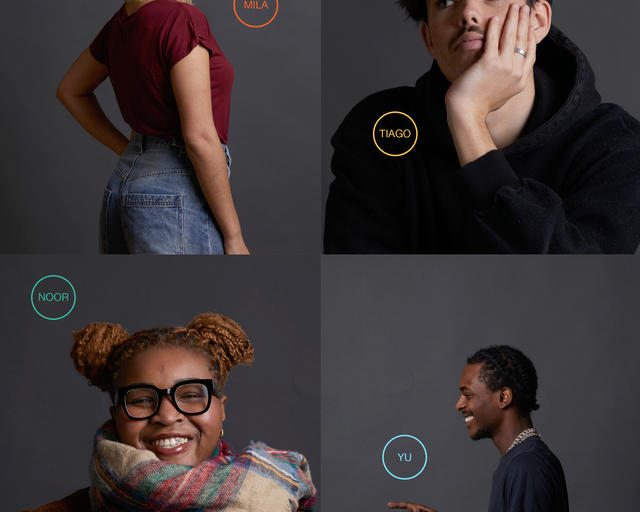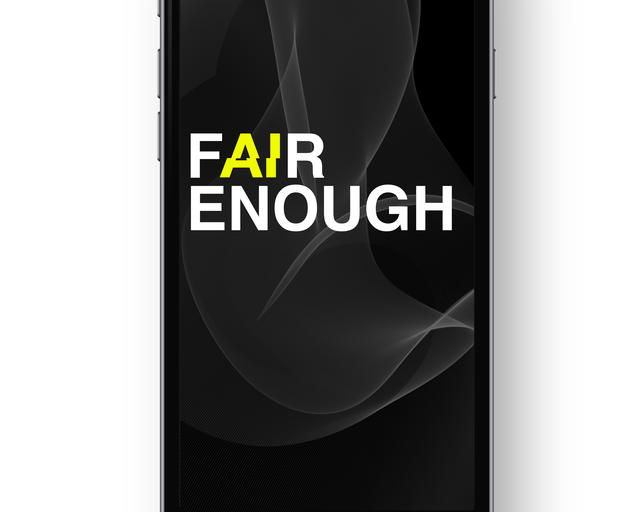Developing your critical thinking about AI
FAIR ENOUGH is an interactive series in eight episodes, which aims to help young people (14 to 17 years old) better understand the presence and role of artificial intelligence (AI) in today's world, but also to encourage them to think critically about how AI impacts their lives. The ethical, social and legal issues raised by AI are addressed in a narrative, playful, and even participatory way. In each episode, users are invited to make choices, to form their own opinions and to share them.
The eight episodes cover essential themes on the place of AI in society: deepfakes, education, health, art and creation, emotional machines, professions, sports, and autonomous vehicles.
All episodes were designed with the help of researchers and experts from different disciplines and industries (e.g., computer science, engineering, sociology, health, etc.) .
Available in English, French, German, Spanish and Dutch.
Enjoy a narrative and interactive experience
“Would you like to use more AI tools for your homework?”
“Should we indicate when a piece of art is made by AI?”
“Would you trust an AI diagnosis and support for a mental health problem?”
Follow the adventures of Noor, Yu, Mila and Tiago, four teenagers with different points of view and sensibilities, who discover the presence of AI in their daily lives. Through their personal experience, they explore each topic and invite the user to take part in their debates. In FAIR ENOUGH, there are no right or wrong answers!
FAIR ENOUGH is aimed at everyone, from beginners to experts. No basic knowledge of AI is required.
Most of the images in these episodes were generated by AI programs, demonstrating the creative and technological capabilities of these image generators, but the portraits of the four teenagers are real photographs. Can you see the difference?
How to use FAIR ENOUGH
FAIR ENOUGH was designed for teenagers, as well as for educators, teachers, facilitators or mediators who work with them. This resource can be used alone or with others, in class, at home or in an educational workshop.
It is free and easy to use:
- The episodes, each about ten minutes long, are independent: you can explore them in any order, or use only the one that suits your needs.
- Use on a mobile device is recommended for an optimal experience, but the app can be accessed on any computer device.
- An Internet connection is required.
- No personal data is collected: users do not need to create an account; just click on the connection link to start
FAIR ENOUGH Teachers' Pack
Download our activity booklet and get inspired by the lesson plans for your own use.
English
English
What is artificial intelligence? (powerpoint)
French
French
Qu'est ce que l'intelligence artificielle ? (powerpoint)
German
German
Was ist kunstliche intelligenz ? (powerpoint)
Spanish
Spanish
Que es la inteligencia artificial? (powerpoint)
- English
- French
- German
- Spanish
English
What is artificial intelligence? (powerpoint)
French
Qu'est ce que l'intelligence artificielle ? (powerpoint)
German
Was ist kunstliche intelligenz ? (powerpoint)
Spanish
Que es la inteligencia artificial? (powerpoint)
More questions?
How does FAIR ENOUGH ensure the safety and privacy of user data?
FAIR ENOUGH does not collect any personal data and users do not need to create an account or provide any personal details in order to use it.
FAIR ENOUGH does not put the user in contact with other individuals or websites, and is free from advertisement.
How does FAIR ENOUGH complement existing educational curricula on AI and technology?
It offers an excellent entry point in the world of AI for teens by positioning the content within the context of situations that they can relate to.
It raises awareness about how AI is used in today’s world, triggering curiosity around the principles of AI, its potential applications and jobs. It also presents some of the core scientific, ethical and societal questions raised by AI.
It offers the opportunity to respectfully discuss and debate these questions, and to forge one’s own views.
It contributes to improving digital and AI literacy and critical thinking skills amongst teenagers.
Does FAIR ENOUGH include ethical considerations of AI? Does it make a judgement on AI?
It aims to help young people better understand the presence and role AI plays in today’s world, and to encourage them to think critically about how AI impacts their lives. The ethical, social and legal issues raised by AI are addressed in a narrative, playful, and participatory way. In each episode, users are invited to make choices, to form their own opinions and to share them.
It does not seek to encourage nor discourage the use of AI. In each episode, the four characters express different views about AI. This diversity of opinion allows users to explore a range of views.
What resources does FAIR ENOUGH offer to help teachers introduce AI concepts in the classroom?
By using FAIR ENOUGH in class, teachers will be able to introduce the subject of AI from a technical, ethical, social and legal perspective.
Moreover, FAIR ENOUGH follows today’s best practice standards in terms of science engagement. These include favoring a horizontal, narrative and dialogue-led engagement with teenagers. It draws on robust, innovative and internationally recognised experiences to engage on science “hot topics”.
How can educators integrate the content into their lesson plans?
It can be used with individuals, or in groups in a workshop setting. Educators can integrate it when they review concepts such as media literacy, digital citizenship, basic digital learning, critical thinking, and more.
As an example, if an educator wanted to integrate it into a lesson, they might:
.Choose an episode.
. Invite students to bring their mobiles, or they can also use other devices: tablets or computers, with an Internet connection. (You can also ask them to prepare it at home before the class). Episodes can be addressed alone or in a group.
. Share the stats and start a discussion.
Is it possible to have specific statistics for a dedicated group?
Yes, you can set up a dedicated space for your own group’s statistics by using this URL: https://www.fair-enough.ai/room.
Once launched, the URL changes and adds new characters at its end. For example: https://www.fair-enough.ai/#QpHhv1. The code /#XXXXXX is different each time.
This URL can then be shared with your students.
How does FAIR ENOUGH make AI concepts accessible to users who have no prior knowledge of the subject?
FAIR ENOUGH uses stories, characters and relatable daily situations to tackle issues around AI from a familiar entry point. Each episode showcases an example of AI technologies being used in daily life and describes a situation with which a teenage audience can easily identify.
All the necessary information and context is explained within the episode in a simple and accessible way. Some optional parts may include more advanced knowledge – for example related to specific AI algorithms – for users who wish to explore the topic more deeply







